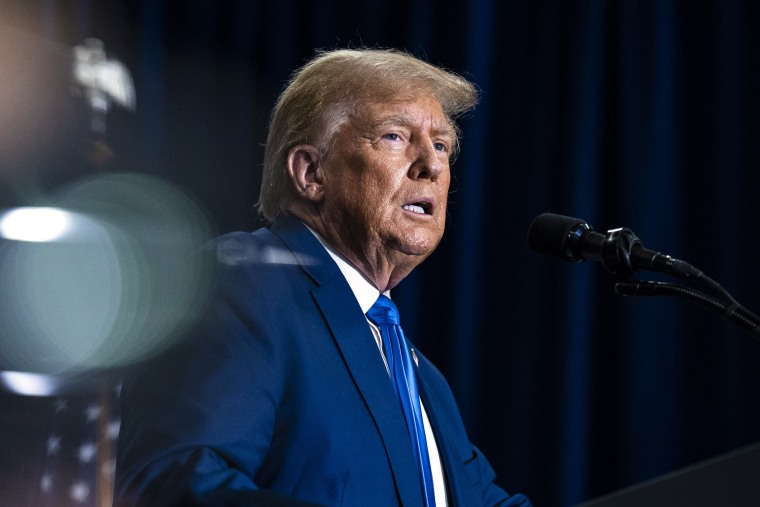A Colorado judge on Friday dismissed an effort to keep former President Donald Trump off the state’s ballot in 2024.
Colorado District Court Judge Sarah B. Wallace issued a ruling in the Trump ballot eligibility case, ordering the Colorado secretary of state to place Trump on the state’s primary ballot for next year.
The ruling is another victory for Trump after courts in Minnesota and Michigan this month rejected similar legal efforts to disqualify him from running for president in those states.

A group of Colorado voters filed a legal challenge to Trump’s candidacy in September, arguing that his efforts to overturn the 2020 election results and his conduct surrounding the Jan. 6, 2021, Capitol riot violated Section 3 of the 14th Amendment to the Constitution, making him ineligible for office.
In her ruling, Wallace found that Trump did engage in an insurrection by inciting a riot on Jan. 6, 2021, but that the president is not subject to Section 3 because he is not an “officer of the United States.”
She disputed that Section 3 of the Fourteenth Amendment applied to Trump, noting that the clause in question explicitly lists all federal elected positions but it does not include the president.
“While the Court agrees that there are persuasive arguments on both sides, the Court holds that the absence of the President from the list of positions to which the Amendment applies combined with the fact that Section Three specifies that the disqualifying oath is one to 'support' the Constitution whereas the Presidential oath is to 'preserve, protect and defend' the Constitution,” Wallace wrote.
She added, “it appears to the Court that for whatever reason the drafters of Section Three did not intend to include a person who had only taken the Presidential Oath.”
Citizens for Responsibility and Ethics in Washington (CREW) and several law firms filed the lawsuit on behalf of the voters.
An attorney for the group of voters who filed the legal challenge said they would appeal.
“The Court found that Donald Trump engaged in insurrection against the Constitution after a careful and thorough review of the evidence,” attorney Sean Grimsley said in a statement. “We are very pleased with the opinion and look forward to addressing the sole legal issue on appeal, namely whether Section 3 of the Fourteenth Amendment applies to insurrectionist presidents. We believe that it does.”
CREW President Noah Bookbinder said in a statement that the group intends to file the appeal to the Colorado Supreme Court “shortly,” adding that when they filed this case, “we knew it likely would not end at the district court level.”
An attorney for Trump did not immediately respond to a request for comment Friday night.
The lawsuit alleged Trump “engaged in insurrection or rebellion” after having sworn an oath to support and defend the Constitution and asked the court to declare that Trump is constitutionally ineligible to appear on any Colorado ballot for state or federal office and to prohibit Secretary of State Jena Griswold from allowing his name to appear on any future primary or general election ballots in the state.
Wallace began hearing arguments in the case last month, with closing arguments in the trial taking place Wednesday.
“Through his actions, and his actions alone, Donald Trump has disqualified himself from ever holding office again,” Grimsley said in a closing argument on behalf of the petitioners.
The former president is facing a string of efforts in other states to keep him off the ballot in 2024 on similar grounds. The Minnesota Supreme Court ruled last week that state law did not bar a major political party from placing a candidate who is ineligible for office on the presidential nomination primary ballot, and a Michigan judge denied a similar effort on Tuesday, finding that the secretary of state lacked the authority to intervene.
In his closing argument, Trump attorney Scott Gessler highlighted those cases, asserting that there is “an emerging consensus here within the judiciary across the United States.”
Top election officials in Arizona, New Hampshire and elsewhere are also weighing concerns similar to those raised in Colorado as they prepare state ballots for next year’s Republican presidential primaries, where Trump is leading in the polls among Republican contenders.
